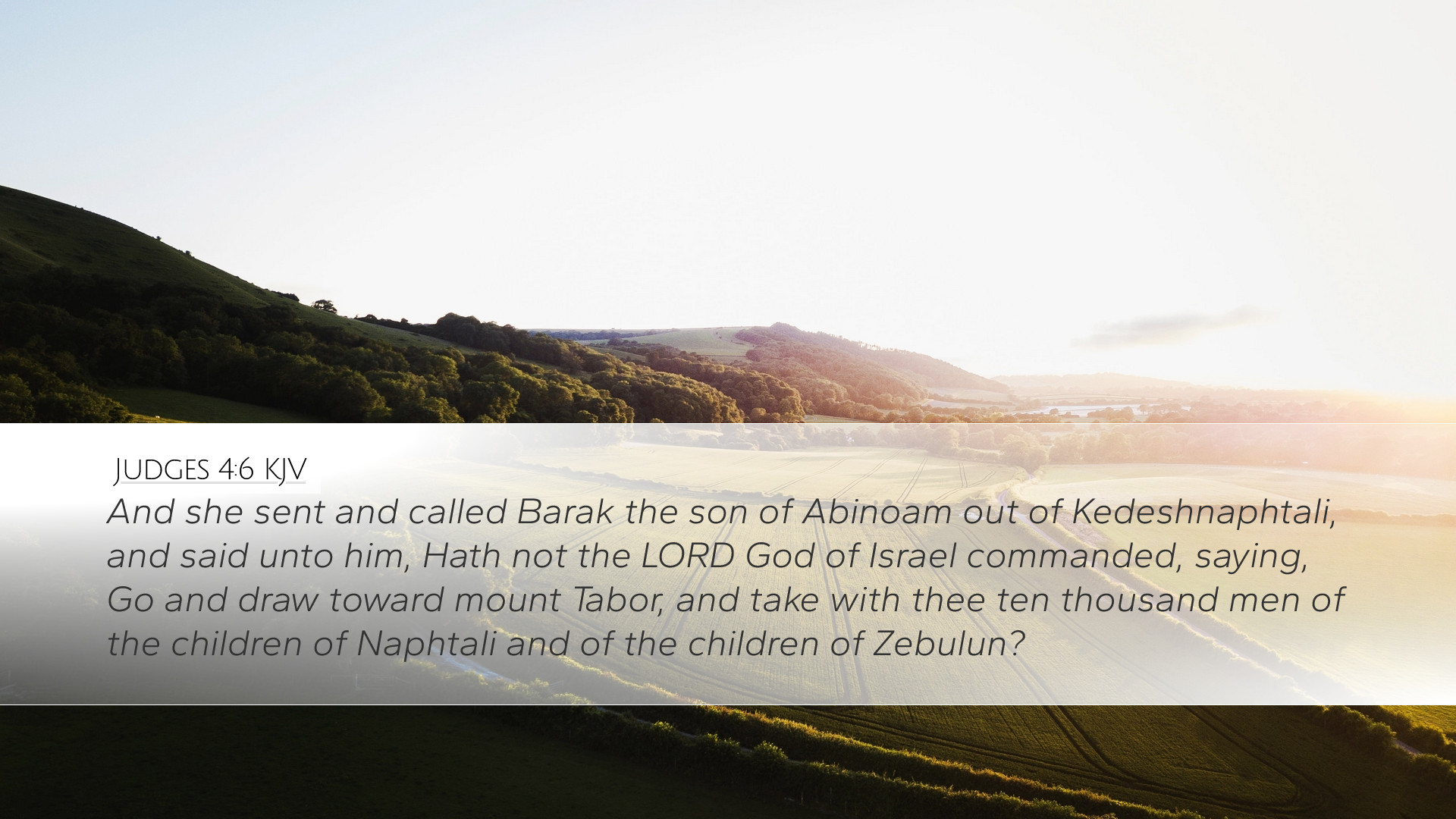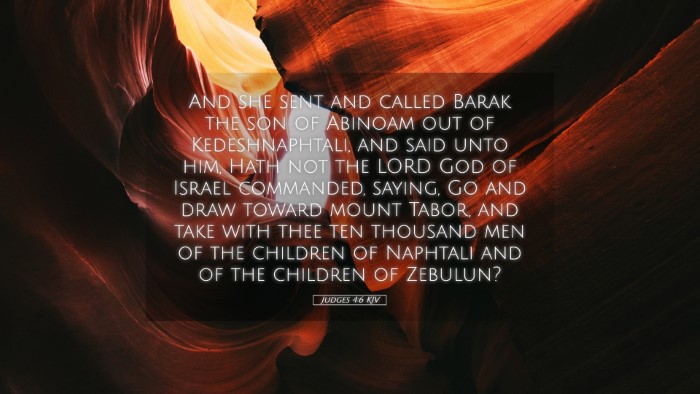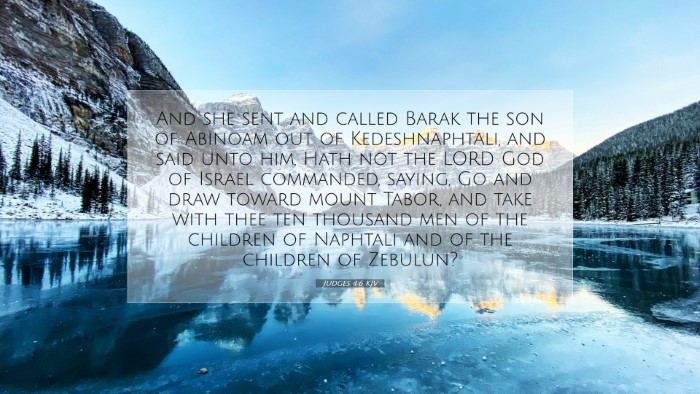Old Testament
Genesis Exodus Leviticus Numbers Deuteronomy Joshua Judges Ruth 1 Samuel 2 Samuel 1 Kings 2 Kings 1 Chronicles 2 Chronicles Ezra Nehemiah Esther Job Psalms Proverbs Ecclesiastes Song of Solomon Isaiah Jeremiah Lamentations Ezekiel Daniel Hosea Joel Amos Obadiah Jonah Micah Nahum Habakkuk Zephaniah Haggai Zechariah MalachiJudges 4:6
Judges 4:6 KJV
And she sent and called Barak the son of Abinoam out of Kedeshnaphtali, and said unto him, Hath not the LORD God of Israel commanded, saying, Go and draw toward mount Tabor, and take with thee ten thousand men of the children of Naphtali and of the children of Zebulun?
Judges 4:6 Bible Commentary
Commentary on Judges 4:6
Judges 4:6 reads as follows: "And she sent and called Barak the son of Abinoam out of Kedesh-naphtali, and said unto him, Hath not the LORD God of Israel commanded, saying, Go and draw toward mount Tabor, and take with thee ten thousand men of the children of Naphtali and of the children of Zebulun?"
Contextual Overview
The Book of Judges recounts the cycles of sin, oppression, repentance, and deliverance experienced by Israel during the time before the establishment of kings. Deborah, a prophetess and judge, emerges as a central figure during Israel's oppression by Jabin, king of Canaan. This context is vital for understanding the significance of her message to Barak.
Insights from Matthew Henry
-
Divine Appointment:
Matthew Henry emphasizes that Deborah's counsel to Barak was rooted in divine appointment. The Lord had commanded Barak to lead the Israelites against their oppressors, reaffirming God's sovereignty in the deliverance of His people.
-
Role of Women:
Henry highlights the extraordinary role of Deborah, noting that God often used unlikely individuals to fulfill His divine purposes. Her leadership as both a judge and prophet illustrates God’s willingness to operate beyond traditional gender roles.
-
Encouragement of Faith:
Henry asserts that Deborah’s challenge to Barak was also an encouragement to act in faith. Her authoritative call to him illustrates that God expects His leaders to trust in His promises and to act decisively.
Insights from Albert Barnes
-
Historical Context:
Barnes points out that the location of Kedesh-naphtali holds historical significance as a city of refuge and an area of military preparedness. This geographical note serves to highlight Barak’s readiness to engage in warfare against Jabin's oppression.
-
Divine Command:
Barnes notes that Deborah reminds Barak of the command given by the Lord. This is significant for understanding the prophetic role, as her reminder points to the weight of God's call on Barak's life—a call that should inspire obedience.
-
Leadership Qualities:
Barnes examines Barak’s response to Deborah, emphasizing that effective leadership requires not only divine calling but also support and collaboration. Deborah’s role as a prophetess underscores the importance of seeking godly counsel in leadership decisions.
Insights from Adam Clarke
-
Spiritual Warfare:
Clarke suggests that Barak’s name, which means 'lightning', symbolizes the swift judgment God is about to execute on Israel's enemies. This reflects the biblical theme of spiritual warfare where God empowers His chosen leaders to confront evil boldly.
-
This as a Foreshadowing:
Clarke also views this moment as foreshadowing the coming of Christ, who would one day deliver His people permanently from oppression—a reflection of the ultimate role of Christ as the redeemer.
-
Human Weakness and Divine Strength:
Additionally, Clarke highlights Barak's hesitance, a reminder of human fragility in the face of daunting tasks. He recognizes the necessity of divine strength in empowering leaders who feel inadequate in their roles.
Theological Implications
This verse encapsulates the essence of divine calling, human response, and the importance of community in the fulfillment of God’s purposes. It raises critical questions for pastors and theologians regarding leadership, obedience, and the role of women in ministry.
Applications for Today’s Context
-
Encouragement to Leaders:
Modern leaders are encouraged to model the faith shown by Deborah and Barak. Even in the face of doubts or societal norms, they are called to step forward in obedience to God's directives.
-
Empowerment of Women in Leadership:
The narrative challenges the church to embrace the perspectives of women in leadership roles, promoting an inclusive approach to ministry that values contributions from all individuals.
-
Faith-Based Action:
Believers today should be spurred to take action on God's command, understanding that true faith involves both belief and action, leading to transformative results in their communities.


